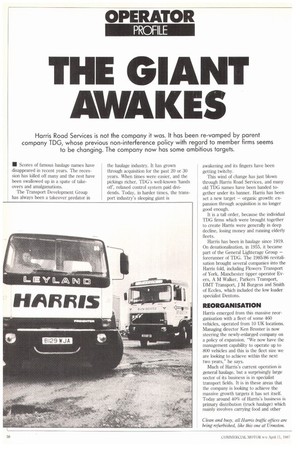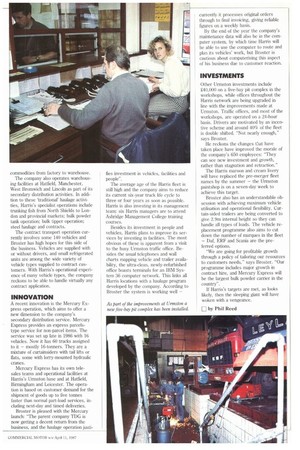THE GIANT AWAKES
Page 60

Page 61

If you've noticed an error in this article please click here to report it so we can fix it.
• Scores of famous haulage names have disappeared in recent years. The recession has killed off many and the rest have been swallowed up in a spate of takeovers and amalgamations.
The Transport Development Group has always been a takeover predator in the haulage industry. It has grown through acquisition for the past 20 or 30 years. When times were easier, and the pickings richer, TDG's well-known 'hands off, relaxed control system paid dividends. Today, in harder times, the transport industry's sleeping giant is awakening and its fingers have been getting twitchy.
This wind of change has just blown through Harris Road Services, and many old TDG names have been banded together under its banner. Harris has been set a new target — organic growth: expansion through acquisition is no longer good enough.
It is a tall order, because the individual TDG firms which were brought together to create Harris were generally in deep decline, losing money and running elderly fleets.
Harris has been in haulage since 1919. On denationalisation, in 1955, it became part of the General Lighterage Group — forerunner of TDG. The 1985/.86 revitalisation brought several companies into the Harris fold, including Flowers Transport of York, Manchester tipper operator Evers, A M Walker, Parkers Transport, DMT Transport, J M Burgess and Smith of Eccles, which included the low loader specialist Dentons.
REORGAIIISATION
Harris emerged from this massive reorganisation with a fleet of some 460 vehicles, operated from 10 UK locations. Managing director Ken Broster is now steering the newly-enlarged company on a policy of expansion. "We now have the management capability to operate up to 800 vehicles and this is the fleet size we are looking to achieve within the next two years," he says.
Much of Harris's current operation is general haulage, but a surprisingly large sector of its business is in specialist transport fields. It is in these areas that the company is looking to achieve the massive growth targets it has set itself. Today around 40% of Harris's business is primary distribution (truck haulage) which mainly involves carrying food and other commodities from factory to warehouse.
The company also operates warehousing facilities at Hatfield, Manchester, West Bromwich and Lincoln as part of its secondary distribution activities. In addition to these 'traditional' haulage activities, Harris's specialist operations include trunking fish from North Shields to London and provincial markets; bulk powder tank operation; bulk tipper operation; steel haulage and contracts.
The contract transport operation currently involves some 140 vehicles and Broster has high hopes for this side of the business. Vehicles are supplied with or without drivers, and small refrigerated units are among the wide variety of vehicle types supplied to contract customers. With Harris's operational experience of many vehicle types, the company reckons to be able to handle virtually any contract application.
INNOVATION
A recent innovation is the Mercury Express operation, which aims to offer a new dimension to the company's secondary distribution service. Mercury Express provides an express parcelstype service for non-parcel items. The service was set up late in 1986 with 16 vehicles. Now it has 60 trucks assigned to it — mostly 16-tanners. They are a mixture of curtainsiders with tail lifts or flats, some with lorry-mounted hydraulic cranes.
Mercury Express has its own telesales teams and operational facilities at Harris's Urmston base and at Hatfield, Birmingham and Leicester. The operation is based on customer demand for the shipment of goods up to five tonnes faster than normal part-load services, including next-day and timed deliveries.
Broster is pleased with the Mercury launch: "The parent company TDG is now getting a decent return from the business, and the haulage operation justi fies investment in vehicles, facilities and people".
The average age of the Harris fleet is still high and the company aims to reduce its current six-year truck life cycle to three or four years as soon as possible. Harris is also investing in its management team: six Harris managers are to attend Ashridge Management College training courses.
Besides its investment in people and vehicles, Harris plans to improve its services by investing in facilities. The most obvious of these is apparent from a visit to the busy Urmston traffic office. Besides the usual telephones and wall charts mapping vehicle and trailer availability, the ultra-clean, newly-refurbished office boasts terminals for an IBM System 36 computer network. This links all Harris locations with a haulage program developed by the company. According to Broster the system is working well — currently it processes original orders through to final invoicing, giving reliable figures on a weekly basis.
By the end of the year the company's maintenance data will also be in the computer system, by which time Harris will be able to use the computer to route and plan its vehicles' work, but Broster is cautious about computerising this aspect of his business due to customer reaction.
INVESTMENTS
Other Urmston investments include £40, 000 on a five-bay pit complex in the workshops, while offices throughout the Harris network are being upgraded in line with the improvements made at Urmston. Traffic offices, and most of the workshops, are operated on a 24-hour basis. Drivers are motivated by an incentive scheme and around 40% of the fleet is double shifted. "Not nearly enough," says Broster.
He reckons the changes that have taken place have improved the morale of the company's 650 employees: "They can see new investment and growth, rather than stagnation and retraction."
The Harris maroon and cream livery will have replaced the pre-merger fleet names by the summer — the Urmston paintshop is on a seven-day week to achieve this target.
Broster also has an understandable obsession with achieving maximum vehicle utilisation and operational flexibility. Curtain-sided trailers are being converted to give 2.9m internal height so they can handle all types of loads. The vehicle replacement programme also aims to cut down the number of marques in the fleet — Daf, ERF and Scania are the preferred options.
"We are going for profitable growth through a policy of tailoring our resources to customers needs," says Broster. "Our programme includes major growth in contract hire, and Mercury Express will be the largest bulk powder carrier in the country".
If Harris's targets are met, as looks likely, then the sleeping giant will have woken with a vengeance.




























































































